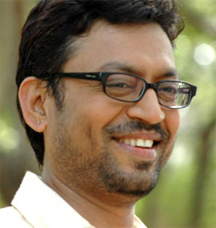MUMBAI, (Reuters) – Irrfan is probably India’s most successful export to Hollywood, having tasted success with experimental roles in several critically acclaimed films such as “Slumdog Millionaire” and “A Mighty Heart.”

But the 40-something actor said he has no plans to move to Hollywood. His last Bollywood outing, “Paan Singh Tomar”, based on the true story of an Indian athlete who turns into a dreaded outlaw, pleased critics and was a sleeper hit at the Indian box-office this month.
Irrfan spoke to Reuters about “naive” Indian audiences, how Hollywood gives him rare experiences and why he doesn’t use his last name any more.
Q: Were you surprised by the kind of success that “Paan Singh Tomar” has seen?
A: “Surprised, in the sense, I was pleasantly surprised. The film has taken care of all the worries and doubts we had.”
Q: (Director) Tigmanshu (Dhulia) has said he was surprised that urban audiences liked it as much.
A: “I wasn’t apprehensive about urban audiences at all. Cinema is changing every week, and multiplex audiences are demanding every week. Although they are very naive, very forgiving. They aren’t like Western audiences, where you have to do so much to bring the audience to the theatre. Here, if you give them something in the film, the audience will patronise it.”
Q: Does the fact that Indian audiences are forgiving mean that we work less hard on our films, as compared to the West?
A: “Our audiences believe in fantasies, we believe in celebrations – even our Gods have affairs. We don’t have a culture of realistic cinema. So even if the film touches them emotionally in some way, they’ll buy it, even if it isn’t credible. They are ready to believe that three sons are lying on the bed and donating blood to their mother. We are simple people. But of course, now they are watching Hollywood cinema and world cinema so now they are getting demanding. They are looking for films that have their own voice, which aren’t ripped from somewhere else. You had film-makers like Bimal Roy and Mehboob Khan in the past, who had their own voices.”
Q: Do you think we’ve lost out on that voice?
A: “I think the new generation will bring it back. After that, the generation which will come, they’ll change cinema completely, and then we’ll understand what crossover cinema is. Right now it’s difficult for us to get the attention of the West. Right now, it’s there in pockets, but we don’t have an international voice.”
Q: A lot of people say that international voice is you.
A: “I’m not a storyteller, I’m just a cog in the wheel. I can recite poetry but I cannot write it. I need a story-teller who I can trust and I can let myself loose.”
Q: Your approach to acting seems very academic. Does that work in Bollywood?
A: “When I went to the National School of Drama, and I dreamt about myself as an actor, I never imagined myself in a suit. I always imagined myself in a different look. I want to feel different all the time. But when you come to an industry where things are valued or judged on the basis of how your film has done in the first three days, you do try to imbibe certain things, because you have to survive as an actor.”
Q: So doesn’t doing films like “Thank You” go against what you believe in?
A: “No, ‘Thank You’ was fine. I enjoyed playing that character. I was trying to entertain people. There have been certain films I have done where it was just a fashion parade – there was nothing to do with the character or the story. I have done films where I was detached from the story, but I had no choice. I didn’t enjoy those experiences, but I was just trying to stay in circulation and trying to make my presence felt.”
Q: Do you regret doing those films?
A: “No, it’s part of the game, you have to survive. You have to save yourself for better opportunities, you have to experiment and you learn from every experiment. That’s how you take it, because once you start regretting, there’s no end to it. I hope I never get to a stage where I start to regret – life is too short.”
Q: Are you using the same approach with Hollywood?
A: “I am very careful. I am privileged to be in Hollywood. I do get a lot of incentives to shift my base there and I could become very busy there. I could keep on doing films there but then I will be repeating the same mistake. Then I’ll have to do films just for my survival. That I can do here. America has a lot more to offer, it gives me a rare experience. America is also a door to different industries like Europe. I haven’t done a European film. I am doing a film now, which is an Indo-German-French collaboration.”
Q: You’ve dropped ‘Khan’ from your name, preferring to be called only Irrfan. Why is that?
A: “This isn’t recent, I did it 10 years ago. People are realising it now. It seems to me that caste, creed and colour are all tools to misuse … people are trapped in these brackets and then misused by people who have the reins.
“I don’t know what to do with it, I cannot change the world (pauses). I don’t like being called as part of a group, where everyone is told that one group is superior to the other. Maybe that’s how I am. I am just here to question.”
